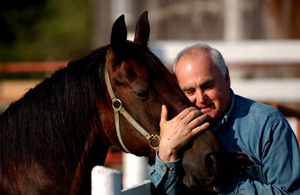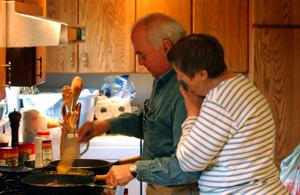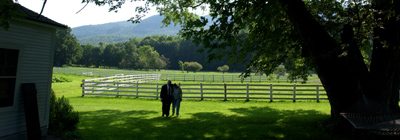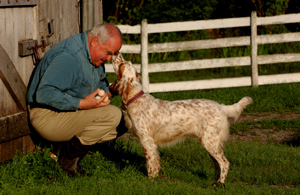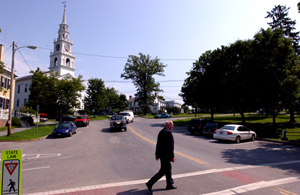 |
|
|||||||||
| Rural Route
Vermont lawyer Peter Langrock took the road less traveled. For him, that has made all the difference. It is 8 a.m. and Peter Langrock and his wife Joann move about the big country kitchen of their 1850s Vermont farmhouse, making breakfast like they do most mornings. He cracks blue-shelled eggs, gathered from their laying hens, into a bowl. She starts the hot milk for café au lait. The sausages sizzling on the griddle of an eight-burner stove come from one of the four Yorkshire pigs they raise each year. Langrock folds the omelets over their filling of homegrown chives and local cheddar. Soon Langrock, AB’58, JD’60, will exchange his jeans for a suit and drive his Grand Marquis the six miles to his law practice in the quaint college town of Middlebury. But first he goes outside, striding across the front yard, past the hammock strung between two tall silver maples, across his dirt driveway, and to the wood-frame barn, where he kisses the nose of his prize-winning Standardbred horse, Salisbury Seth. Then he turns and wades through long grass, wet with morning dew, pointing out his crops. “Here’s my corn and squash and pumpkins. Here are a couple apple trees I put in.” Rising beyond his 300 acres are the hills of the Green Mountain National Forest. He follows Joann to the chicken shed while she feeds the chickens and the young turkey poults that will end up as Thanksgiving dinner for the Langrocks and their three children and four grandchildren. From his patch of paradise in a state that is among the nation’s most rural—with about half as many cows as people—Langrock, 65, a Queens, New York, native, has cultivated a lifestyle and career that mirror the independence and liberal sensibilities of his adopted home. His firm, Langrock Sperry & Wool—among the largest and most prestigious law firms in Vermont with offices in Burlington as well as Middlebury—handles an assortment of legal issues, from the rural cases Langrock has documented in two books to the 2001 landmark legislation that resulted in Vermont’s legalization of civil unions for same-sex couples. For the moment only Kady the English setter breaks the quiet, barking at some Canadian geese on the pond. A red-tailed hawk circles overhead, and barn swallows sweep in and out of the outbuildings, aged gray from years of harsh New England weather. By Langrock’s own standards he is living the good life, and he knows it. He stands surveying his bucolic surroundings, smoking a postbreakfast cigar, and notes with a grin, “Had I joined a big law firm I might now be able to afford the life I’ve lived for 42 years.” Though langrock grew up a city kid, he developed a love for the Green Mountains in the 1940s when his father, a schoolteacher, worked summers managing a hotel on Vermont’s Lake Dunmore. As a high-school sophomore Langrock applied to the University of Chicago’s early-admission program and arrived at the University in 1954, a 16-year old freshman armed with a scholarship to help with the $690 tuition. In three years he finished his undergraduate studies and enrolled in the Law School. With small classes, law students got to know their teachers well, and his professors, Langrock declares with the fervor of a closing argument, were “the greatest faculty ever assembled.” He especially credits Karl Llewellyn with giving him an understanding of the law’s human significance. When Edward H. Levi, PhB’32, JD’36, then dean of the Law School, approached him about a clerkship with the Ninth District U.S. Court of Appeals in San Francisco, Langrock was ambivalent, even though it was a plum job. So he went to talk to one of his professors, Soia Mentchikoff.
“She asked me one question,” he remembers. “ ‘Where do you eventually want to live?’ When I said, ‘Vermont,’ she said, ‘Then what in the hell do you want to go to San Francisco for?’ It was as simple as that.” So after graduation Langrock went directly to Vermont and took the bar exam with 13 other aspiring lawyers. At that time there were fewer than 300 lawyers practicing in the state. Langrock decided to run for state’s attorney, and in the summer of 1960 he and Joann, whom he’d recently wed, went door to door—which in many parts of Addison County meant traipsing across farmland to meet farmers in their fields. He estimates that he visited 80 percent of the county’s residences. He won the half-time job and officially assumed the position in February 1961. To supplement the $2,000 annual salary he opened a part-time law practice. Today that practice numbers 23 lawyers, and Langrock is known throughout the state as a tough litigator. What his mentor Llewellyn had taught him at Chicago was that the practice of law is all about people—and their disputes. And in mid-20th-century Vermont those people were a colorful, cantankerous lot. He recounts his early experiences in Addison County Justice: Tales from a Vermont Courthouse (1997) and its sequel, Beyond the Courthouse (1999). The tales he tells exude a certain historic charm, even when they are about serious misdeeds. One man on trial for attempted murder jumped out the second-story window of the courthouse. Because there had been so much snow that winter he landed, unhurt, in a huge snow bank and escaped. Memorable characters from Langrock’s books include George “Punk” Farr, who retired in 1952 as county clerk but ran the office until his death in 1961. Farr’s constant companions at work were his dog, Lady, and his pet mouse, which lived in the courthouse walls. Lawyers who had business with the county clerk had to step around the mouse’s saucer of milk and brush dog hair from their suits. In the 1970s Langrock defended a rural marijuana grower charged with dealing drugs. Langrock’s defense, which he dubs “the zucchini defense,” could only have been persuasive in a rural community. He argued that like any good farmer, the defendant had germinated a lot of marijuana seeds to ensure that he’d have a few plants for himself. But so many sprouted, and what gardener can throw out a healthy plant? When the 25 plants matured, there was too much marijuana for him, so he gave some away to friends—just the way Vermont farmers give away zucchini every August. Langrock quoted the old Vermont saw that you only lock your car in the summer because if you don’t, one of your neighbors is liable to fill it with zucchini.
Typical of the small-town cases Langrock took on was a dispute between “Doc” Mitchell and his brother Bob over a deer pool—whoever bagged the largest deer got a brand-new deer rifle, a .300 Savage. Doc brought in a 200-pound, 12-point buck, but its state of rigor mortis led the brother to believe Doc had bagged it before hunting season began. Bob further contended that the deer had been left in water overnight to soak up more weight, and that Doc had put a lead pipe in the deer’s throat. Bob refused to pay, so Doc filed suit for the price of the gun. The deer was skinned, and a quantity of water poured out. Doc did not get his gun. That 1960s story says something about the large role that animals played in Vermont life well into the 20th century. Sometimes they were even a lawyer’s payment for services. Langrock got his first horse, Big Red, in trade from a client. In 1967 he got a second horse, also a swap. But this horse was a racer, a harness racer, and before long Langrock found himself immersed in a new pastime. He has since raced in the United Kingdom and New Zealand as well as in Vermont and Saratoga, New York. Langrock placed fourth in the 1987 North American Amateur Driving Competition. In 1994 he and Salisbury Seth won four in a row at the Vermont State Fair in Rutland. Though he and Salisbury Seth both retired last year—“I don’t bounce as well as I used to”—he still breeds Standardbred horses. A ten-minute drive from the farm is the Middlebury office of Langrock Sperry & Wool, LLP. Langrock takes pride in this 1801 Federal building, which after extensive remodeling in the 1840s gives the appearance of a grand Greek Revival home. His office is in one of the two fireplaced parlors and shows evidence of his passions for racing and painting—many of his own oils adorn the walls. Langrock has made two additions to the back of the house (both architecturally correct, according to Middlebury College professor of art and architecture Glenn Andres). The hallways twist like a maze, and at every turn Langrock pokes his head into an office greeting colleagues. He may be the biggest lawyer in town, but in this office he is “Peter” to everyone (except one lawyer, Frank “Fritz” Langrock, AB’85, who calls him “Dad”). Though he has written many colorful and humorous anecdotes about his work as a country lawyer, Peter Langrock is no hick. He has handled his share of weighty cases: his current practice is 25 percent criminal law. And recently his firm made legal history. In 1997 two of his partners, Beth Robinson, JD’89, and Beth Murray, successfully represented Vermont’s landmark case involving the rights of same-sex couples. In Baker v. State they argued for gay partners’ constitutional right to the benefits and protections of civil marriage. Following the December 1999 Baker decision Murray and Robinson spearheaded a statewide lobbying effort that ultimately led to the passage of Vermont’s civil-union law.
“I’m so proud of my partners,” Langrock says. “Without their efforts this would never have come about. They did the research, found the plaintiffs, brought the lawsuit, tried the case, took the appeal. And after the Vermont Supreme Court decision, they lobbied through the civil-union legislation. The important thing is that the whole firm backed them and protected them.” Langrock himself has twice argued in front of the U.S. Supreme Court, on environmental issues concerning Lake Champlain and its lakeshore. Both cases involved International Paper Company, accused of dumping sludge into the lake and fouling the air with emissions. In arguing one of the cases Langrock brought in the longtime tollbooth operators at tiny Crown Point Bridge, not too far from Middlebury. As Langrock writes in Addison County Justice, “Their testimony was simple and unanimous: whenever there was a south wind coming from the direction of the mill, people from out of state would roll down their windows, stop their cars, and say, ‘What the hell is that awful smell?’ We didn’t have consulting companies or professional sniffers, but there was no doubt that we had the better of the argument.” The paper company settled, plaintiffs were paid, and a $500,000 trust fund was established to underwrite research projects on the lake, including a University of Vermont study of lake-cress, and outreach programs to teach local schoolchildren about the effects of outside forces on water quality and ecosystems. Langrock is now representing a class of soybean farmers in an antitrust action against the Chicago Board of Trade. After a 1989 resolution passed by the board, the market dropped precipitously. The suit is an attempt to regain what American farmers lost in soybean pricing as a result of the resolution. The case is pending before the United States Court of Appeals for the Seventh Circuit. Though Langrock began his professional
life as a Republican (“If you wanted to be elected in Addison
County, you had to be a Republican”), he switched parties
in 1964, and his liberal leanings are informed by his opinions about
the country’s judicial system. Practicing law is indeed a cerebral endeavor, but Langrock has created a life that balances the thinking with the doing. When he goes home at night and exchanges his business suit for blue jeans, there are no arguments or fancy legal footwork that will override the necessities of daily farm life. As the sun sets over the foothills, Langrock can survey his garden, his barns, his horses and chickens and know that he is as firmly rooted in the Vermont countryside as the massive silver maples that have stood in his yard for much of the past century.
|
|
Contact
|

